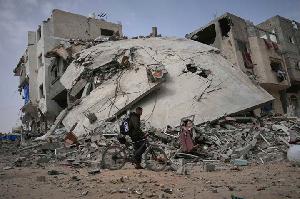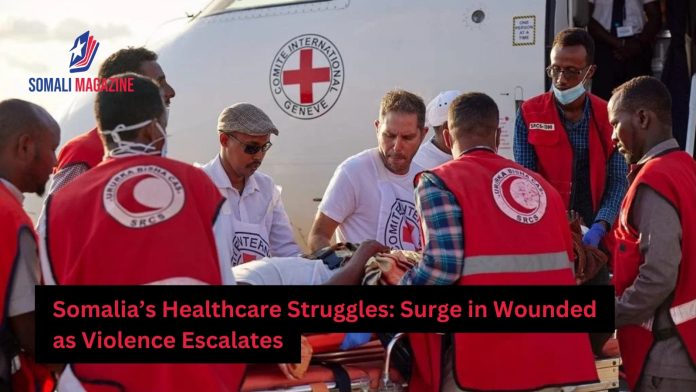Facebook Twitter Instagram Somali Magazine - People's Magazine
Somalia is witnessing a sharp escalation in violence, with hospitals struggling to cope with a surge in weapon-wounded patients as fighting intensifies across the country. The International Committee of the Red Cross (ICRC) has reported a significant increase in casualties since the beginning of 2025, highlighting the devastating impact of renewed hostilities on civilians and healthcare systems.
In a statement released on April 11, the ICRC revealed that medical facilities near active frontlines are overwhelmed by the influx of patients. Madina Hospital in Mogadishu, supported by the ICRC, admitted 203 weapon-wounded individuals in the first quarter of the year—a staggering 26% increase compared to the previous three months. The surge in violence has also forced over 100,000 people to flee their homes, exacerbating Somalia’s humanitarian crisis.
The Middle and Lower Shabelle regions have been particularly affected, with intensified clashes between Somali forces and Al-Shabaab militants leading to widespread displacement and civilian casualties. Military operations in Bari, Puntland, and confrontations in Sool and Sanaag regions have further strained resources, leaving hospitals struggling to meet the growing demand for emergency care.
The ICRC has mobilized emergency teams and supplies to support affected communities, delivering medical equipment to 20 hospitals across Somalia. Between January and March, the organization provided surgical tools, dressing materials, and first aid kits to address the surge in conflict-related injuries. Additionally, the Somali Red Crescent Society (SRCS) has played a critical role in evacuating wounded individuals and offering emergency care through its ambulance services.

Despite these efforts, the situation remains dire. The ICRC has called on all parties to respect international humanitarian law and ensure the protection of civilians and healthcare workers. Antoine Grand, head of the ICRC delegation in Somalia, emphasized the urgency of the crisis: “Civilian lives are at stake, and we urgently call on all parties to respect their obligations under international humanitarian law”.
The resurgence of violence comes at a critical juncture for Somalia, which is grappling with a looming drought and significant funding gaps in humanitarian aid. The combination of armed conflict and environmental challenges threatens to erode coping mechanisms for millions of people, leaving them vulnerable to displacement, food insecurity, and disease outbreaks.
Al-Shabaab militants have seized key locations in Middle and Lower Shabelle, disrupting international flights and targeting government officials. A bomb blast narrowly missed President Hassan Sheikh Mohamud’s convoy in March, underscoring the group’s continued threat to Somalia’s stability. The government, backed by African Union-led peacekeepers, has intensified military operations to reclaim territory and weaken Al-Shabaab’s influence.
Humanitarian organizations have expressed concern about the long-term impact of the violence on Somalia’s healthcare infrastructure. Hospitals near conflict zones are operating at full capacity, with limited resources to address the growing needs of displaced populations. Aid agencies have called for increased international support to provide food, clean water, and medical supplies to affected communities.
As Somalia navigates this challenging period, the focus remains on mitigating the impact of the violence and addressing the root causes of instability. The ICRC’s report serves as a stark reminder of the urgent need for collective action to protect civilians and support healthcare systems in conflict-affected areas.

